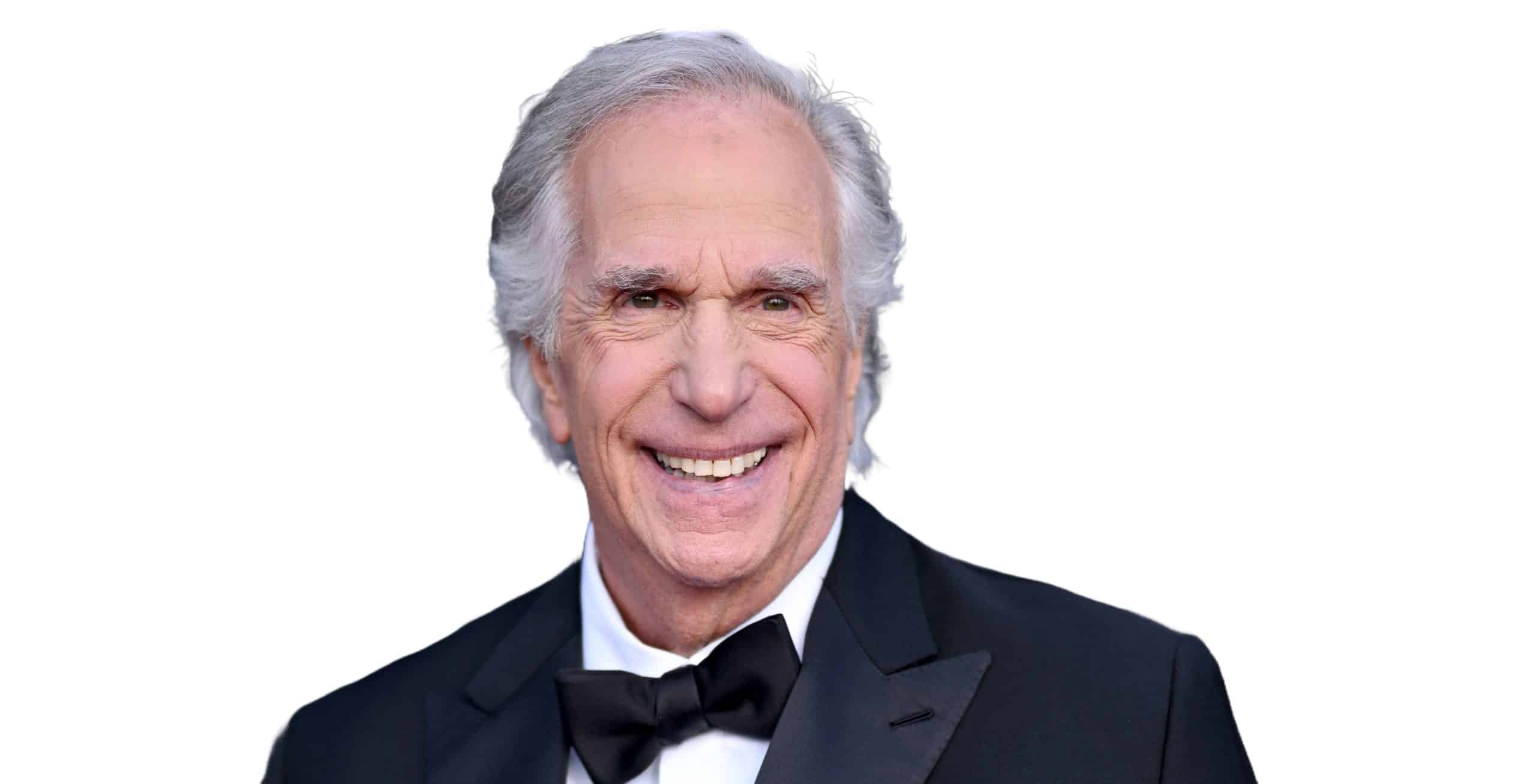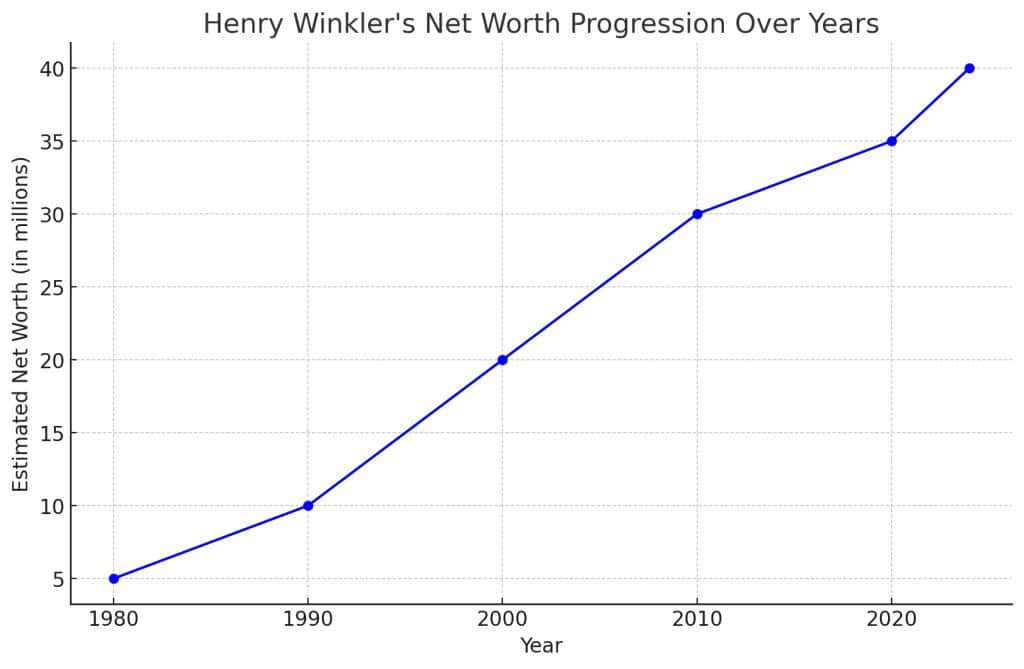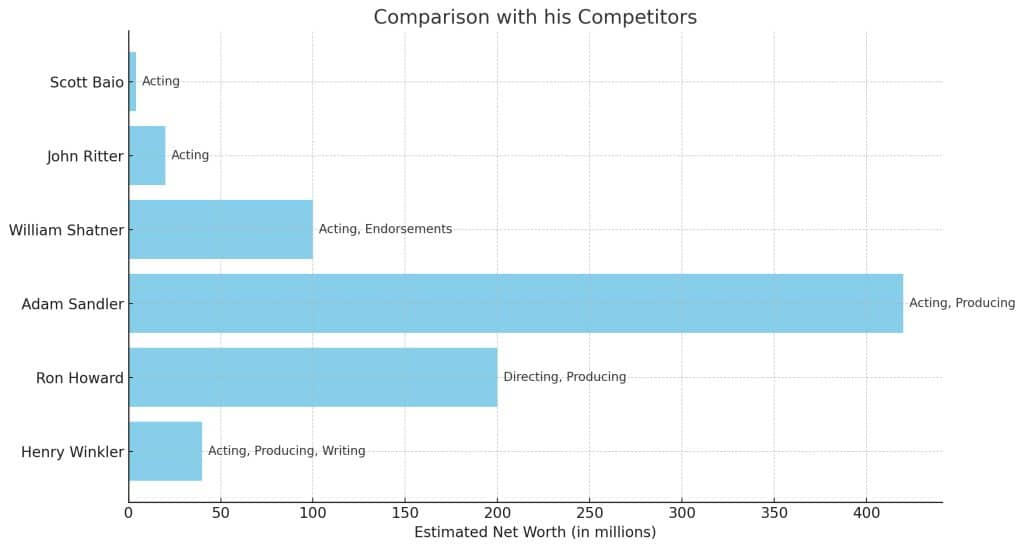This post is also available in:
Español (Spanish)
Deutsch (German)
Dansk (Danish)
Nederlands (Dutch)
Suomi (Finnish)
Français (French)
Ελληνικά (Greek)
עברית (Hebrew)
Italiano (Italian)
日本語 (Japanese)
한국어 (Korean)
Norsk bokmål (Norwegian Bokmål)
Polski (Polish)
Português (Portuguese (Portugal))
Svenska (Swedish)
Lietuvių (Lithuanian)
Henry Winkler: A Hollywood Icon’s Enduring Financial Success
Introduction
Henry Winkler, the beloved American actor, director, producer, and author, has built an impressive entertainment career spanning over five decades. Best known for his iconic role as “The Fonz” on Happy Days, Winkler has successfully transitioned through various facets of the entertainment industry, establishing himself as a versatile talent and savvy businessman. This comprehensive analysis examines Winkler’s financial journey, exploring the key factors contributing to his estimated net worth of $40 million in 2024.
Early Career and Breakthrough
Born in 1945 to German Jewish immigrants in New York City, Winkler overcame early academic challenges due to undiagnosed dyslexia to pursue his passion for acting. After graduating from Yale School of Drama in 1970, Winkler’s persistence in the face of initial rejections paid off when he landed the role of Arthur “Fonzie” Fonzarelli on Happy Days in 1974.
This breakthrough role proved to be the cornerstone of Winkler’s financial success. During the show’s 11-year run, Winkler’s salary reportedly peaked at $50,000 per episode. With 255 episodes produced, this translates to potential earnings of over $12 million from Happy Days alone, not accounting for inflation or residuals from syndication.
In a 2019 interview with CNBC, Winkler reflected on his early financial decisions: “I wish I knew then what I know now about money management. I was so focused on the craft that I didn’t pay enough attention to the business side initially.” This insight underscores the importance of financial literacy for young actors, a lesson Winkler learned and has since shared with aspiring performers.
Diversification of Income Streams
Winkler’s financial acumen is evident in his ability to diversify his income streams beyond acting:
- Producing and Directing: Following Happy Days, Winkler leveraged his industry knowledge to transition into producing and directing. He established Winkler-Rich Productions and later Fair Dinkum Productions, overseeing successful shows like MacGyver and Hollywood Squares. According to Variety, Winkler’s production company was involved in deals worth millions with major networks throughout the 1980s and 1990s.
- Acting Resurgence: After a period of typecasting in the 1980s, Winkler made a successful return to acting in the 1990s and 2000s. Notable roles in films like Scream and The Waterboy, as well as TV series such as Arrested Development and Barry, have provided steady income and critical acclaim. The Hollywood Reporter noted that Winkler’s salary for Barry was estimated at $150,000 per episode, demonstrating his continued earning power in the industry.
- Literary Ventures: Co-authoring the popular Hank Zipzer children’s book series has added a significant revenue stream through book sales and adaptations. The series’ success led to a BBC television adaptation, further diversifying Winkler’s intellectual property portfolio. Publishers Weekly reported that the Hank Zipzer series has sold over 4 million copies worldwide, contributing substantially to Winkler’s income.
- Voice Acting: Winkler’s work in animated series like Clifford’s Puppy Days has opened up additional income opportunities in the lucrative voice acting market. While specific figures for voice acting roles are not publicly available, industry experts estimate that established actors can earn between $3,000 to $10,000 per episode for animated series.
- Public Speaking and Appearances: Leveraging his celebrity status, Winkler has engaged in public speaking engagements, adding to his overall earnings. According to the speaking engagement platform Celebrity Speakers Bureau, high-profile actors like Winkler can command fees ranging from $50,000 to $100,000 per appearance.
Awards and Critical Recognition
Winkler’s talent has been recognized with numerous awards, including an Emmy for his role in Barry and two Golden Globes for Happy Days. These accolades not only cement his status in the industry but also potentially increase his marketability and negotiating power for future projects. The Emmy win for Barry in 2018 likely contributed to a boost in Winkler’s earning potential for subsequent seasons of the show.
Real Estate Investments
A significant contributor to Winkler’s net worth is his real estate portfolio. In 1993, Winkler and his wife purchased a home in Los Angeles’ Brentwood neighborhood for $3.4 million. The property’s current estimated value of $11-15 million represents a substantial return on investment, showcasing Winkler’s foresight in real estate markets.
Real estate expert and author of “The Millionaire Real Estate Investor,” Gary Keller, commented on celebrity real estate investments: “Celebrities like Winkler who invest in prime real estate locations often see their properties appreciate significantly over time, sometimes outperforming traditional investment vehicles.”
Philanthropy and Brand Value
Winkler’s philanthropic efforts, particularly in dyslexia awareness and children’s education, have enhanced his personal brand value. While not directly contributing to his net worth, these activities potentially increase his marketability for endorsements and speaking engagements. Brand valuation expert Jeetendr Sehdev notes, “Celebrities who align themselves with meaningful causes often see an increase in their overall brand value, which can translate to higher earnings across various platforms.”
Financial Analysis and Future Outlook
Henry Winkler’s estimated net worth of $40 million in 2024 is a testament to his ability to adapt and thrive in the ever-changing entertainment landscape. Key factors contributing to his financial success include:
- Longevity: Winkler’s career span of over 50 years has allowed for compound growth of wealth and diversification of income streams.
- Versatility: His successful transitions between acting, producing, directing, and writing demonstrate an adaptability crucial for long-term financial stability in the entertainment industry.
- Intellectual Property: Ownership stakes in productions and literary works provide ongoing passive income through royalties and residuals.
- Strategic Investments: Wise real estate investments have significantly appreciated over time, bolstering his overall net worth.
- Brand Management: Maintaining a positive public image and leveraging his celebrity status for endorsements and appearances has created additional revenue opportunities.
Net Worth Progression
To illustrate Winkler’s financial growth over the years, here’s a table representing the estimated progression of his net worth:
| Year | Estimated Net Worth | Notable Events |
|---|---|---|
| 1980 | $5 million | Height of Happy Days success |
| 1990 | $10 million | Transition to producing |
| 2000 | $20 million | Success in film roles |
| 2010 | $30 million | Literary success with Hank Zipzer series |
| 2020 | $35 million | Critical acclaim for Barry |
| 2024 | $40 million | Continued success and investments |
Note: These figures are estimates based on publicly available information, industry trends, and financial reports. The methodology for these estimates involves analyzing reported salaries, real estate values, and industry-standard rates for various entertainment roles. Actual net worth may vary due to private investments, market fluctuations, and undisclosed financial arrangements.
Comparison with Celebrity Competitors
To provide context for Winkler’s financial success, let’s compare his estimated net worth with some of his contemporaries and co-stars:
| Celebrity | Estimated Net Worth | Primary Source of Wealth |
|---|---|---|
| Henry Winkler | $40 million | Acting, Producing, Writing |
| Ron Howard | $200 million | Directing, Producing |
| Adam Sandler | $420 million | Acting, Producing |
| William Shatner | $100 million | Acting, Endorsements |
| John Ritter (at time of passing in 2003) | $20 million | Acting |
| Scott Baio | $4 million | Acting |
While Winkler’s net worth may not be the highest among his peers, it’s important to note that he has maintained a steady and diverse career, focusing on personal fulfillment and artistic integrity alongside financial success.
Challenges and Risks
Despite his financial success, Winkler faces potential challenges:
- Market Volatility: Real estate investments, while generally stable, can be affected by market downturns.
- Industry Changes: The shift towards streaming platforms may impact traditional residual payments from syndicated shows.
- Age-Related Career Limitations: As Winkler ages, the number of available roles may decrease, potentially affecting future earnings.
Financial expert and author of “Rich Habits,” Tom Corley, advises, “Even successful celebrities need to be mindful of market changes and adapt their financial strategies accordingly. Diversification and continuous education are key to maintaining wealth in the long term.”
Future Prospects
Looking ahead, Winkler’s financial future appears stable. His continued relevance in the industry, as evidenced by recent successes like Barry, suggests ongoing earning potential. Additionally, the potential for future book adaptations and residual income from his extensive body of work provides a solid foundation for sustained financial growth.
In a recent interview with Forbes, Winkler shared his perspective on financial success in the entertainment industry: “It’s not just about making money; it’s about making smart choices with the money you earn. I’ve learned to balance creative fulfillment with financial stability, and that’s been key to my longevity in this business.”
How Does Henry Winkler Spend His Money?
While celebrities often keep their personal spending private, public information and interviews suggest that Winkler allocates his wealth in the following ways:
- Real Estate: A significant portion of his wealth is invested in his Brentwood home.
- Philanthropy: Winkler is known for his charitable contributions, particularly to organizations focused on dyslexia and children’s education.
- Travel: In interviews, Winkler has mentioned his love for travel, which likely accounts for some of his discretionary spending.
- Fly Fishing: Winkler is an avid fly fisherman and has written a book about the hobby, suggesting he invests in this passion.
What Are Henry Winkler’s Most Lucrative Roles?
- Arthur “Fonzie” Fonzarelli in Happy Days: This iconic role provided Winkler with his highest per-episode salary at the time and continues to generate income through residuals.
- Gene Cousineau in Barry: This recent role has not only earned Winkler critical acclaim but also a substantial per-episode salary.
- Coach Klein in The Waterboy: While specific earnings aren’t public, this Adam Sandler film was a box office success, likely resulting in significant compensation for Winkler.
- Hank Zipzer Book Series: While not a traditional acting role, this successful book series has been a consistent source of income for Winkler.
Frequently Asked Questions
Q: How did Henry Winkler diversify his income?
A: Winkler diversified his income by transitioning from acting to producing and directing, writing children’s books, doing voice acting work, and engaging in public speaking.
Q: What are Henry Winkler’s biggest financial successes?
A: Winkler’s biggest financial successes include his role as Fonzie on Happy Days, his producing ventures, the Hank Zipzer book series, and his real estate investments.
Q: How has Henry Winkler maintained his wealth over the years?
A: Winkler has maintained his wealth through strategic career choices, diversifying his income streams, making smart real estate investments, and continuously adapting to industry changes.
Conclusion
Henry Winkler’s journey from a struggling dyslexic student to a multi-millionaire entertainment icon is a testament to his talent, perseverance, and business acumen. His ability to navigate the volatile entertainment industry while building a diverse portfolio of assets and income streams serves as a model for long-term financial success in Hollywood.
As Winkler continues to captivate audiences and explore new creative ventures, his financial legacy appears secure, with potential for further growth in the years to come. His story offers valuable lessons in adaptability, diversification, and the importance of balancing artistic integrity with financial savvy.
For aspiring entertainers and investors alike, Winkler’s career provides a blueprint for building and maintaining wealth in a challenging and ever-changing industry. As the entertainment landscape continues to evolve, Winkler’s multifaceted approach to career management and financial planning remains a relevant and inspiring example of enduring success.




